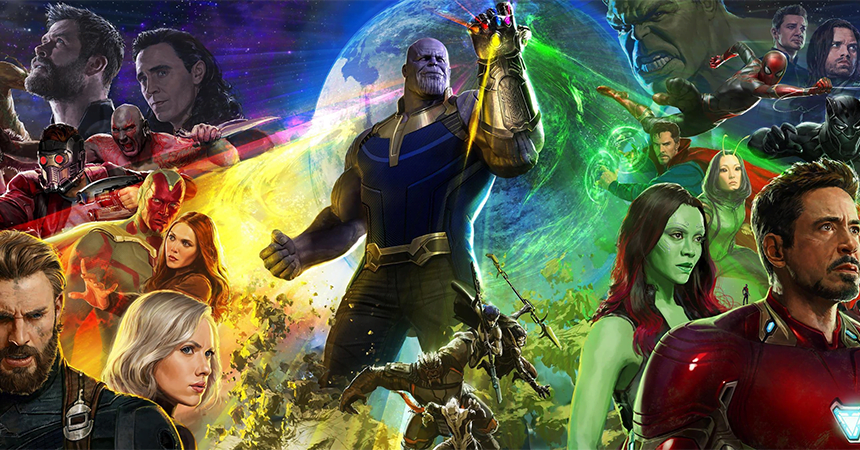The following review includes MAJOR plot spoilers.
It’s been ten years since the Marvel Cinematic Universe (MCU) began, producing a chain of eighteen superhero movies which soon made it the biggest movie franchise in the world. Over the years, superhero movies have gotten more complex and are no longer simplistic plot lines about the good guys beating up the bad guys but instead reflect contemporary socio-political conundrums and philosophical takes on the multiple greys involved in ‘doing good’. And so, a decade full of storytelling built the momentum for Avengers: Infinity War, giving us a movie that’s unparalleled in many ways.
With a jam-packed cast and multiple story lines to portray, it’s inevitable that most characters get relegated to the side-lines. If the movie does have a protagonist then it’s the supervillain, Thanos. After witnessing the apocalypse of his native planet Titan, Thanos has a disturbingly noble plan to save the universe (with its diminishing resources and increasing population) – by wiping out half of all sentient life on it. What follows is almost three hours of watching the world’s mightiest heroes fail miserably at stopping him and be reduced to a bunch of ragtag amateurs with half-baked plans such as stealing Thanos’ infinity gauntlet.
If the movie does have a protagonist then it’s the supervillain, Thanos.
With Thanos, the MCU decisively resolves its problem of weak villains, which was already strengthened by Kilmonger in Black Panther and Hela in Thor: Ragnarok. If Captain America and Thor’s gleaming muscles allude to hegemonic masculinity then Thanos’ massive proportions make him the very embodiment of hypermasculinity. Yet, in closely depicting Thanos, the MCU adds soul to its protagonist-villain even if he is a Nazi-like fanatic and genocidal baddie. All this is in glaring contrast to the fact that with nineteen movies out, the MCU still lacks a standalone movie with a woman protagonist.
Gamora from the Guardians of the Galaxy team is the sole female character that gets substantial plot time. But this is largely due to the fact that she is Thanos’ daughter. In the second Guardians’ movie, we saw a compelling emotional arc about Gamora’s past and how Thanos’ competitive nature sparked her rivalry with her sister Nebula. In the end, the two sisters come to a reconciliation, and Nebula who has been cybernetically advanced every time she lost to Gamora in battle, goes off to seek revenge against their adoptive father.
In Infinity War it’s revealed that she has been captured and Thanos has Nebula tortured to blackmail Gamora into revealing the location of the soul stone to him. In less than a minute, this usually unfeeling and tough-as-nails superheroine gives in to him, trading a stone that could help kill half the universe for a single life. Thanos is no doubt a narcissistic and abusive father and it would have been empowering to see either of his two abused daughters take him out or at least successfully attack him, but this, of course, doesn’t happen.
Also Read: A Feminist Reading Of Thor: Ragnarok
Instead, moments after calling her the deadliest woman in the galaxy, Thanos throws Gamora off a cliff in exchange for the soul stone, reducing her to an unrescued damsel in distress. This is not to say that the subplot isn’t convincing or logical, it is, but it doesn’t make the cut under a feminist gaze. Do all stories involving women have to be empowering ones? Not really, but it’s important to be critical of women’s stories adhering to disempowering tropes.
One scene that stands out in the movie, putting its few female characters together, is when Scarlet Witch is being pulped by Thanos’ smokey-eyed henchwoman with the words “You will die alone”. In an instant, Black Widow and Okoye turn up to defend her and Widow pronounces “She’s not alone“. It’s a fun, girl power moment but a minuscule and forced one in a nearly three-hour-long movie. Another great moment is when the discussion about Vision’s surgery establishes that the Wakandan princess Shuri is indeed smarter than Bruce Banner with his seven PhDs.
with nineteen movies out, the MCU still lacks a standalone movie with a woman protagonist.
Despite a lousy gender report card, the end-credit scene hints that the MCU might still be able to step it up in phase three. As Thanos’ grand plan is realised, Nick Fury and Maria Hill are shown driving in New York. Earth’s mightiest heroes have failed and the situation couldn’t look bleaker as drivers and pilots start vaporising into dust mid-way and causing accidents. As Fury starts to vanish, he manages to swear and page an SOS signal to someone. The last shot is of the pager lying on the road, showing a red and blue star, the emblem of Captain Marvel aka Carol Danvers.
The first top-tier superheroine to be joining the Avengers, Captain Marvel is like a female Superman. Her superpowers include superhuman strength and durability, flight, the ability to absorb and redirect energy and the power to shoot laser beams from her hand, like Iron Man but more amplified.
The MCU has already said that she will be the strongest Avenger on the team and positing her as a beacon of hope in Infinity War means there is a lot riding on the shoulders of this character. This also increases the danger of her becoming a Mary Sue – a character who is so perfect that she is completely unrealistic and unrelatable. With her debut slated to release next year which will also be Marvel’s first solo superheroine movie, we can only hope that Captain Marvel fills up the MCU’s deficits with women superheroes.
Also Read: Black Panther Review: An Insight Into An Invincible Decolonial Utopia
Featured Image Credit: BoxOffice Pro
About the author(s)
Nolina Minj is a freelance writer and researcher. She is a gender and decolonial studies enthusiast, book hoarder and Hispanophile.





A solo movie for Black widow and Wakandan women is annouced.
The Wakandan women too? Lovely.
You want Gamora to go toe to toe with thanos when even Hulk didn’t have a chance? Oh, maybe Gamora is not as stupid as you. She knows that it’s pointless to go against his OP dad. If you keep your disgusting gender politics from comic book movies, that would be great.
Erm, she does try in Knowhere. You clearly don’t remember the entirety of the movie. Please keep your hate-filled vitriol away from feminist sites where you don’t belong.
ya whatever. You guys can never enjoy anything except complaining. Good Bye!
Astute observations will definitely sound like a complaint to a worthless internet troll like you. But let me elucidate you on something, while just watch a comic book movie I have read comic books dating back to the 60s. So I am more knowledgeable than you. I am looking forward to the day when we can have an Afro-American transgender Bruce Wayne.
I commented on this post because i am an avid comic book readeR.
Is it important for us, as feminists to always have our women to be perfect. I loved Infinity War, as a movie and also as a staunch feminist. Yes, mcu has further to go but this movie seems like a step in right direction and I thongtit should be appreciated.
Don’t worry all your sjw agendas will be fulfilled in the upcoming Captain Marvel movie.
Actually, the far superior Netflix shows are technically a part of the MCU. I loved the movie, but I do agree with the post. If you are interested, you can check the two seasons of Marvel’s Jessica Jones on Netflix.
You do realize that you showed your self-hating sexism by calling Captain Marvel a “female Superman”? What? A woman can’t be her own superhero and has to be compared with a man? Please erase your own biases against female superheros before you write an article like this.